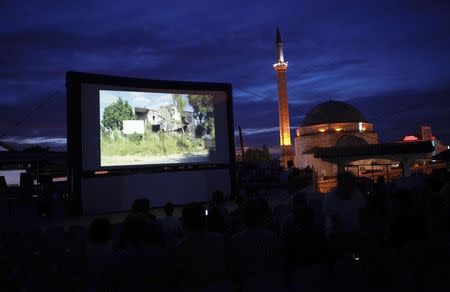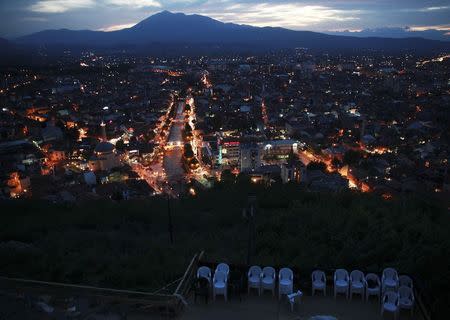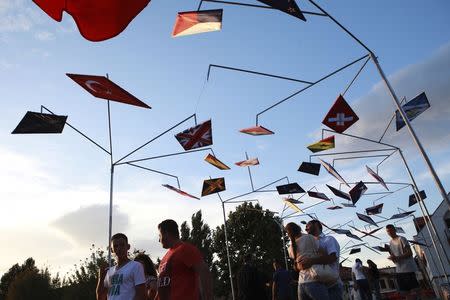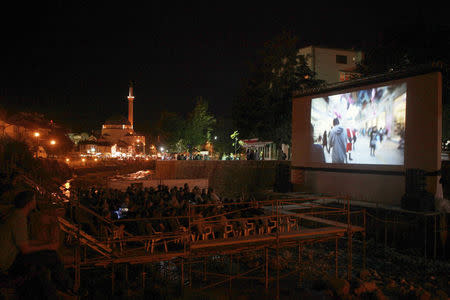Dokufest - a documentary film festival putting Kosovo on cultural map
By Fatos Bytyci PRIZREN Kosovo (Reuters) - Under a starry sky, young Kosovars take their seats alongside tourists on a platform rising from the shallow Bistrica River that cuts through Prizren, bats darting overhead in the moonlight. Others dangle their legs from the stone riverbank walls - all drawn to the latest offering of Dokufest, the 13-year-old international documentary and short film festival that is putting Kosovo well and truly on the cultural map. Veton Nurkollari, the festival's creative director, watches as participants from all over the world queue for kebabs, bread and a bottle of the local beer. Prizren, a centuries-old trading hub and cultural crossroads, is buzzing. Organisers say last year they sold more than 10,000 tickets to festivalgoers but this year the number is growing. Some 40 percent of the visitors are foreigners. "Dokufest is producing good news," Nurkollari says. For 15 years this tiny, landlocked country has struggled to shake the image of a war-torn, crime-ridden nation, best known in the West as the venue for NATO's 1999 war against Serbia to save Kosovo's ethnic Albanians from massacre and expulsion. Organisers and festival volunteers here are part of a generation of young, urban, Internet-savvy Kosovars trying to change perceptions and nurture a cultural scene too often starved of official attention and financial support. Since its inception in 2002, Dokufest has grown into the largest cultural event in Kosovo, and a draw for foreigners out to explore the Balkans. There are obvious echoes of the Sarajevo film festival, which grew from the rubble of the Bosnian capital, besieged for 43 months in the early 1990s, to become one of Europe's top events in film. This year at Dokufest, more than 230 documentaries were selected from nearly 2,400 submissions. MOSQUES, CHURCHES From a hard-hitting Austrian look at prostitution in Thailand, Bangladesh and Mexico (Whore's Glory), to a camp Spanish rehash of the New Testament (Fist of Jesus), Dokufest reaches far and wide as a counterpoint to the tabloid starlets and trashy pop music scene that have become so prevalent in the Balkans since Yugoslavia's demise. "Today, this region's culture is being replaced by pop culture, street culture, but Dokufest is doing its job to fill the gap with a more valuable offering," says Agon Hamza, a 29-year-old PhD student and regular Dokufest visitor. For just over a week, Dokufest takes over Prizren, with seven cinemas including four in the open air, set amongst the mosques and churches that testify to this town's rich heritage. One screen sits atop the medieval Prizren fortress, another in a square near the 17th-century, Ottoman-era Sinan Pasha Mosque. At one cinema, nestled in a garden, a generator donated by German peacekeepers churns out power to compensate for the regular electricity cuts that still frustrate Kosovo. NATO has about 5,000 soldiers in the country of 1.8 million people, a much scaled-back force now rarely called to arms. "We're trying to tell people that Kosovo is a much safer place, and most people are convinced when they get here," Nurkollari says. And Charlotte Cook, director of programming at Hot Docs, North America's largest documentary festival, and a member of the Dokufest jury agrees. "People know about the conflicts that have happened here and there is a lot of misinformation about the region and about Kosovo," she says. Soaking in the atmosphere, Florian Habicht, a filmmaker from New Zealand, says: "If the moon is shining while you're watching the film, it's an experience you'll never forget." (Editing by Matt Robinson and Louise Ireland)






